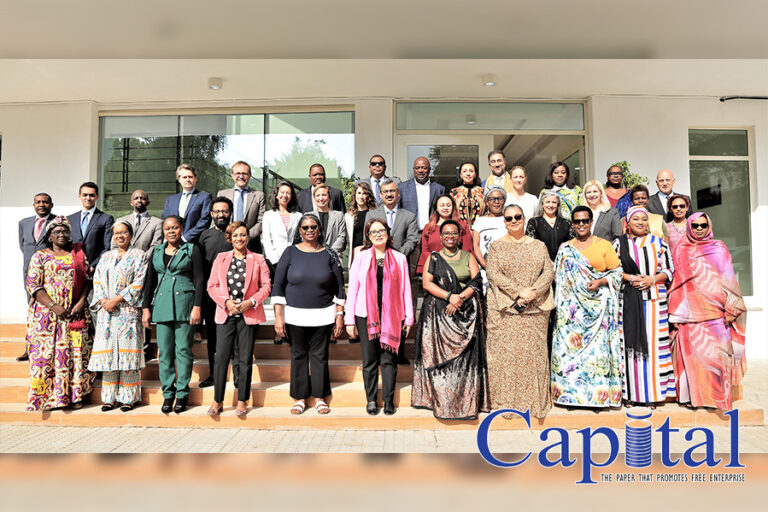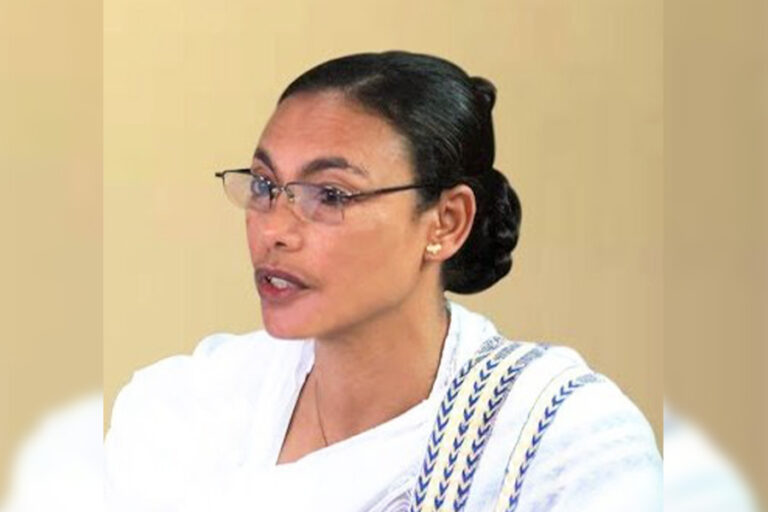Travel Ethiopia hosted an event on Saturday March 26, 2022 that took place at Gola Park St George Gallery under the theme ‘creating awareness on domestic tourism’.
Hirut Kassaw, Head of Addis Ababa Culture, Arts and Tourism Bureau, Aster Solomon President of Addis Ababa Hotels Associations and other invited guests attended the event.
Brief discussion was held between participants on the development of the hospitality and tourism sector. As tourism plays a very important role in the political, economic, cultural and environmental development of countries. Additionally participants has said the positive side of the role the tourism sector plays saying that it is a foreign currency earner. The sector is also one of the most employment generator.
The participants said that local tourism is expensive and everyone cannot afford it, so the concerned stakeholders should do something to promote local tourism economically.
Hirut Kassaw said that her office and the Mayor will together with the tour operators and support them in any way they can.
Aster Solomon said that there are 176 hotels in Addis Ababa and many hotels suffered from the effects of Covid. She added that people do a lot of religious visits but underscored the need to also start travelling to visit local tourist attractions.
Ashenafi Kassa, Tour Guides Association President also said that there are 200 guides where 15 are women tour guides. He said that the industry is highly affected and businesses is really shut for the past years due to Covid and then above all that the security of the country deteriorated significantly making it impossible for the association members to get a job.
Besides creating awareness about tourism the day also celebrated two young bold women on the occasion of women’s international month inspiring excellence of women who went against all the odds.
One of them is Meron Fikadu who lost her leg when she was 16. Then she caught lung cancer. It was said that all she wanted was to have a child and against all odds she delivered a baby boy.
The other Meron Kebede is also a cancer survivor. She came back from the US to support women suffering from breast cancer in Ethiopia.
Travel Ethiopia is a private, eco-minded tour and safari operator established in 1994. Its vast experience allows Travel Ethiopia to introduce the traveler to the myriad facets of Ethiopia’s past and present. Its two directors have extensive experience in tourism. Samrawit Moges has directed tours throughout the country since 1981.
Bringing women to the spotlight
DISTORTED CONCEPTION IN BUSINESS
Business is an activity whose main objective is to make profit. Continuous accumulation is a built-in feature of all business organizations. However, it is not always easy to make profit, at least not today. In advanced industrial countries, almost all small startups fail. In the US, 95% of new small businesses fail within five years of origination. There are many factors that cause businesses to fail. Some of the exogenous factors affecting a business are difficult to foresee, while others can be anticipated and somewhat mitigated, assuming there is capable management with some foresight in command!
From the outset we would like to declare that we do not fully subscribe to the publicly preached conception of business (business schools, media, etc.) Business as an activity that is largely predictable (business plan), straightforward (sales forecast) and ultimately profitable (pro forma profit) is not well founded. We believe business in general is anything but predictable! Since many businesses are stuck with such outdated doctrines, they tend to spend precious time fiddling with their books to satisfy longstanding expectations (mostly by outsiders) about general performance, including revenues, profit, growth, etc. What is usually expected of businesses by their shareholders, banks, analysts or other stakeholders, seem to override the reality happening on the ground. There is hardly a business that doesn’t exaggerate and paint a bright future and to substantiate the exaggerated spin all sorts of trickeries are used, particularly in the realm of the big corporates. One would assume that such unappetizing activities are more in tune with stale government bureaucracies rather than dynamical entities engaged in continuous value creation! Unfortunately the global reality is, corporations have become pretenders and not performers. We believe corporations have set themselves up for continuous failure and it is because of such misguided policies the global sheeple is forced to bail them out ad infinitum! TBTF (Too Big To Fail) is now the motto for all corrupt and inefficient business organizations as well as their cronies in power/governments.
The major problem with business is; it tends to attract, rather disproportionately, psychopaths, those who crave for obnoxious attention, exaggerated entitlement, obsessive control and perennial manipulation. Unfortunately ordinary business serves like a magnet for the born greedy. Enlightened self-interest is not something that comes readily to the accomplished crooks in business. Look at what is happening in the world of finance/banking today. Literally all the big/major banks in the world are insolvent and need the continuous injection of money (capital, etc.) from their sheeple via all sorts of state apparatus (central banks, etc.) Why? Because they were so selfish they forgot the very meaning of honesty and truthfulness, the very foundation of banking, at least as expounded by the banksters themselves! The world is now paying a dear price for their hubris by way of falling living standard in the OECD (reduced pension, increased taxes, etc. for example 37% of the Greeks now live below the European poverty line) and unsustainable economic arrangements in the peripheries!
It is helpful to divide business organizations into two broad categories. The first are businesses run by formally and rigidly established bureaucratic entities. The second; enterprises run by entrepreneurs. In the case of the former the model is in close proximity with the hierarchical and stifling organizations of the state. Business schools teach this model as if it were the ultimate in business formation, without pointing the myriad shortcomings associated with unsustainable dinosaurs! Since changing old ways might rock the boat, the status quo dares not take risk, thereby forfeiting the only fighting chance it has to survive in changing/future market. ‘Stick to your knitting’ might not be all that appropriate in a world of business always in dynamic flux! In many formally setup business organizations, as opposed to those created by entrepreneurship, corporate executives are, by and large, ‘empty suits’, fancy attire without much in the way of substance! Many just love the trapping; to portray an ‘aura’ of a ‘hot shot’ executive, without being one! Remember our old characterization of Africa’s parasitic elites as ‘belly thinkers’? Well, today we have a more sardonic version.
On the other hand enterprises run by entrepreneurs tend to be agile, hence necessarily small, resourceful and often creative. These entities can see change from afar as they are not massively invested in old stuff and staff. They are usually in tune with the times and are willing to take advantage of gaps that might exist in the ever-changing markets. Entrepreneurs are not always driven by the profit motive. Many have an innate drive to do what they want, while coming up with something novel and new, benefitting the larger society. Many an entrepreneur considers escape or liberation from the ordained world of the status quo as the major challenge of life. They tend to have a burning desire to be free, free from the old. We admit, freedom in its absolute sense is absurd, but individual freedom can be approximated if one can secure means as well as attain obscurity.
Gender equality to address climate change
A Breakfast round table conversation co-hosted by the ambassadors of the Republic of Rwanda Hope Tumukunde Gasatura and the Kingdom of Morocco Nezha Alaoui M’hammdi, in celebration of the international women’s day with a free discussion on the pressing issue of ‘Gender Equality to Address Climate Change’ was hosted at the new chancellery of the Kingdom of Morocco on March 30. The event was attended by Ambassadors, Representatives of Embassies, UN, Ministries, and Think tank groups.
During the round table discussion speakers shared their expertise and opinions on the challenges, policies and efforts in fighting the adverse effects of climate change on women and girls.
The addresses of the panelists and the discussion that followed, highlighted the fundamental need of involving women as active and able partners whose expertise can be used in climate change mitigation, disaster reduction and adaptation strategies.
They also stressed that Africa, despite its low contribution to greenhouse gas emissions, remains the most vulnerable continent to climate change impacts. Gender equality, being the cross cutting issue through the MDG Goals, must be given high attention, as there can be no sustainable development without gender equality.
The panelists also said that policy makers in Africa and the community as a whole need to take actions to mitigate the exponential collateral damages posed on the financial, economic, health, social and infrastructural progress, employing gender sensitive mechanisms that recognizes the pivotal role of women.
“Women not only represent half of the global population,” but according to the latest UN Women Fact sheet, “Women farmers account for 45-80% of all food production in developing countries, depending on the region.”
The participants also stressed that about two-thirds of the female labour force in developing countries, and more than 90 percent in many African countries, are engaged in agricultural work. Climate change and disasters also endanger women’s and girls’ health by limiting access to services and health care, as well as increasing risks related to maternal and child health. Hence it is crucial that the rights of women are ensured in regards to food security, non-discriminatory access to resources, and equitable participation in decision-making processes.

and Ergoge Tesfaye, Minister of Women and Social affairs
The discussion delved into how climate change impacts women and girls; Why gender equality is key to sustainability and development; How climate action is crucial to address peace and security in Africa; and What we can do to support solutions for women through the south-south cooperation.
In their respective statements, the ambassadors of the Republic of Rwanda and the Kingdom of Morocco showcased the giant steps their respective countries made in coping with climate change and its consequences.
The two countries have taken exemplary actions to mitigate and adapt to climate change and its effect on women.
In the case of Rwanda, the Ambassador highlighted the remarkable role of women in traditional justice practices; achieving 61% women representation at the political arena; banning plastic packaging as well as the critical role women played fighting Covid-19.
Morocco’s commendable efforts in modern water management and irrigation systems was underlined by the ambassador who shed light in the various programs and initiatives undertaken with Pan African approaches and South-South cooperation, keeping women empowerment at the heart of its programs based on 3 initiatives: Stability, Security and Sustainability.
Ergoge Tesfaye, Minister of Women and Social affairs said in her part that climate is the defining crisis of our time and a matter of survival for women due to un-proportionate burden. She said that the government of Ethiopia has been at the forefront in international negotiations on climate change mitigation and environment policy and gender is center in the national adaptation and mitigation plan of climate change in Ethiopia; not just at policy level but translated into action as well;
Monique Zanzabaganwa, Deputy Chairperson of AUC on her part said that the world is seeing disproportionate impact due to climate change; Africa is facing the height of the burden. She added that there needs to have integrated gender policies that are building women resilience to climate change and to make sure that women and girls are seating at the center of decision making table.
Letty Chiwara, UN Women Representative to Ethiopia on her part said that climate change is a ticking time bomb for Africa and millions of girls in Ethiopia are displaced in the Somali and Oromia regions due to unprecedented drought; losing animals at a pace we have never seen before. “Gender is an emergency: It will take 121.7 years to address gender equality in Africa. In addition to women’s access in various sectors slowing down, girls access to education was negatively impacted by Covid-19 and the role of civil society in raising awareness as well as each of us playing our role in promoting respect between men and women.”
Tourism sector development and challenges
Pundits in the tourism and hospitality sector argued that those who are expected to realize the magnitude of the sector does not have a clear picture about it, which is becoming a challenge to tap the option to benefit from it.
At an event held on tourism sector development and challenges hosted by Addis Ababa Chamber of Commerce and Sectoral Association (Addis Chamber) experts on the sector said that lack of understanding for the sector is one of the major challenge in the industry.
Hirut Kassaw, Head of Addis Ababa Culture, Arts and Tourism Bureau said that she is concerned that the public and even government officials have proper understanding of what tourism is.
“The tourism sector is not properly understood by the public and even political leaders. It is important to fully realize the magnitude of the sector which is crucial for the development,” Hirut, who was also a professor on the sector at Gonder University, said.
“Due to that it is easily affected when problems occurred in different occasion,” she added.
The former professor said that Ethiopian tourism is considered as for the reach and foreigners, while local tourism which is vital to economy is very poor.
“To expand the domestic tourism it is supposed to be affordable and support by different policy instruments,” Hirut added by showing the cost of airfare and accommodations that is very expensive for the locals.
“Making the sector cost effective is very important if we want to see the sector develop in general and domestic tourism in particular,” she added.
She said that according to World Truism Organization (WTO) annual report Ethiopia is included on the green list for tourism potential, while in service or facilitation the country is listed in yellow and red lists that are bad standard. The infrastructure sector is always in the red list as per WTO report.
Thewodros Atlabachew, prominent consultant on the tourism sector, said that most of the challenges and possible solutions tabled for the government and relevant actors are almost similar.
At the panel discussion under the motto of ‘the doing business environment with a focus on tourism and hospitality sector’ he said that to change the scenario commitment is crucial from all parties.
Getahun Alemu, President of Ethiopian Tourism and Hotel Marketing Association, said that association partnership with similar global bodies in the sector is crucial to cooperate and even get the market. He shows that his association signed MoU with similar foreign organs that enable the country to be included on their tourism package.
Andinet Feleke, President of the Ethiopian Tour Operators Association, said tourist attraction by itself is not a product, “if we want the destinations to be a source of revenue we have to massively conduct promotion.”
According to Mesenbet Shenkute, President of Addis Chamber, the tourism sector contribution for the GDP is about nine percent and 10 percent of job for Ethiopia.






